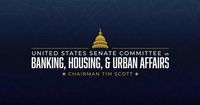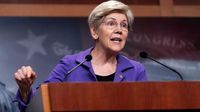On April 6, 2025, Democratic senators, led by Senator Elizabeth Warren (D-Mass.), called on Senator Tim Scott (R-S.C.), chair of the Senate Banking Committee, to convene a hearing regarding President Donald Trump’s authority to impose tariffs on over 180 countries. The senators expressed concerns over the "economic chaos" stemming from what they described as Trump’s "lack of a coherent strategy" in implementing these tariffs.
In a letter addressed to Scott, the Democrats highlighted the significant role of the Committee on Banking, Housing, and Urban Affairs, which oversees key aspects of the International Emergency Economic Powers Act (IEEPA). This act has been cited by Trump as his legal authority to impose sweeping tariffs. The senators warned that the president may grant tariff exemptions to favored business leaders and industries, raising questions about fairness and transparency in his tariff policies.
Warren and her colleagues pointed to a troubling trend revealed in a study published in The Journal of Financial and Quantitative Analysis. Researchers from the State University of New York at Buffalo, Fordham University, University of Oklahoma, and Lehigh University found that companies making political contributions to Republicans were more likely to receive tariff exemptions. In contrast, those supporting Democrats were less likely to benefit from such exemptions.
"Tariffs can be critical to grow American industry and promote good manufacturing jobs. But many of the president’s tariffs lack a coherent strategy, generating economic chaos and giving giant corporations an excuse to raise prices on Americans," the senators wrote in their letter.
Senate Democrats underscored the importance of holding a hearing to clarify Trump’s tariff policies and their implications for the American economy. "We urge you to hold a hearing so the American people can understand the president’s plan and how it will affect their economic futures," they concluded.
In a related statement, Warren emphasized Congress's potential to act, stating, "Congress is not without power. Republicans in Congress can join Democrats to pass a resolution immediately to turn off President Trump’s tariffs." This call for action reflects a growing frustration among Democrats regarding the unchecked authority granted to the executive branch in trade matters.
On April 4, 2025, Warren had already urged Republicans to collaborate with Democrats to overturn Trump's use of the IEEPA to impose tariffs that could jeopardize the economy. The senators argued that the president's broad authority under the IEEPA should not be misused to implement trade policies that could harm American families.
"The committee has jurisdiction over key aspects of IEEPA and tariffs as a tool, and we have a responsibility to the American people to exercise our oversight function to scrutinize how the president is using them," the letter stated.
Warren also pointed out the risks associated with Trump's tariff agenda, which she claimed lacks a coherent strategy and could lead to further economic instability. She expressed concerns that big corporations might exploit the situation to raise prices unnecessarily, thereby squeezing consumers.
The Democratic push for a hearing comes amid a backdrop of bipartisan concern regarding Trump's tariff policies. Some Republican lawmakers have voiced their discontent with the president's approach, suggesting that Congress should reclaim its role in regulating trade. Senator Chuck Grassley (R-Iowa) has announced plans to introduce the bipartisan Trade Review Act of 2025, aimed at reasserting Congress’s constitutional authority over trade policy.
Grassley remarked, "For too long, Congress has delegated its clear authority to regulate interstate and foreign commerce to the executive branch." His proposal seeks to ensure that Congress has a significant voice in trade matters, reflecting a growing sentiment among lawmakers that the balance of power must be restored.
As the debate over tariffs continues, the implications for American consumers and businesses remain significant. The Democratic senators’ call for a hearing is not just a matter of oversight; it represents a broader concern about the economic consequences of the president’s unilateral decisions.
With the potential for tariffs to impact prices on everyday goods, the stakes are high. The Democratic senators’ insistence on transparency and accountability in tariff policy underscores the need for a collaborative approach to economic governance.
As discussions unfold in Washington, the outcome of the proposed hearing could shape the future of U.S. trade policy and its impact on the economy. The senators' efforts to hold the administration accountable reflect an ongoing commitment to ensuring that economic decisions are made with the interests of all Americans in mind.
In conclusion, the push for a hearing on Trump's tariff policies highlights the urgent need for clarity and coherence in U.S. trade strategy. As the economic landscape evolves, the role of Congress in overseeing executive actions will be critical in safeguarding the interests of American families and businesses.


